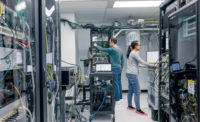HERNDON, VA—Volkswagen Group of America Inc. and Redwood Materials Inc. are collaborating to create a supply chain to recycle Volkswagen and Audi electric vehicle batteries in the United States.
“For Volkswagen, going all-in on electrification means driving sustainable solutions at every turn,” says Scott Keogh, president and CEO of Volkswagen Group of America. “Redwood Materials is a great partner to help us accelerate EV adoption in America. This collaboration allows us to move closer toward our goal of closing the loop for a circular EV economy, giving American consumers yet another reason to go electric.”
Battery recycling will be facilitated by Volkswagen Group’s nationwide network of approximately 1,000 dealers, starting with the Volkswagen and Audi brands. Redwood will work directly with dealers and Volkswagen facilities to identify end-of-life batteries and materials, and then safely package and transport them to its Nevada facilities.
With the Volkswagen Group planning to introduce more than 25 new battery electric vehicles to American consumers through 2030, the carmaker wants to establish battery recycling capabilities for current and future vehicles in North America now.
Redwood recycles tens of thousands of lithium-ion batteries annually from a variety of sources, including EVs, consumer devices and battery production scrap. Redwood extracts raw materials such as cobalt, copper, nickel and lithium; refines and remanufactures them into critical battery components; and delivers those parts back to domestic battery cell manufacturers.
“The transition to electric transportation and clean energy is coming, and the batteries powering these technologies present an incredible opportunity. As more and more batteries reach end of life each year, an increasing and infinitely recyclable resource becomes available,” says J.B. Straubel, founder and CEO of Redwood Materials. “Redwood and Volkswagen Group of America share a vision to create a domestic, circular supply chain for batteries that will help improve the environmental footprint of lithium-ion batteries, decrease cost and, in turn, increase access and adoption of electric vehicles.”
The goal of the collaboration is to reduce battery costs and the need to mine and ship raw materials.


